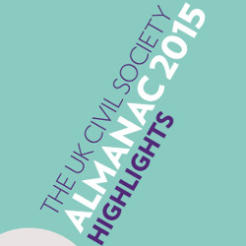Total voluntary sector income fell slightly to £40.5bn in 2012/13, with the fall down to a sharp drop in government income, according to data published today in the UK Civil Society Almanac.
The almanac, published by NCVO and the Third Sector Research Centre, showed that total income was down by £100m in real terms.
Income from government fell by £500m in real terms between 2011/12 and 2012/13, while income from indviduals increased by £300m.
The sector’s income peaked at £42.1bn in 2007/08. In 2011/12 it was £40.6bn and provisional figures for 2013/14 suggest a modest rise to £40.7bn.
According to the almanac, which is in its 14th year, the sector has seen no growth in spending since 2006/07, with total spending for 2012/13 holding steady at £39.3. Provisional figures for 2013/14 suggest that it will fall to £39.1bn.
It has calculated the voluntary sector’s contribution to the economy at £12.1bn - up from £11.8bn the previous year.
Workforce figures show that the number of people employed by the sector rose sharply for the second year running.
Total sector workforce in 2014 was 821,000 – up from 800,000 the previous year. But the number of full time employees fell from 508,000 to 497,000 and the number of part-time workers increased to 324,000 from 291,000. This means that part-time employees now make up almost 40 per cent of the total workforce.
Two-thirds of the workforce are female. Some 11 per cent are temporary contracts, higher than both the public and private sector which have eight per cent and five per cent of people temporary contracts respectively.
Sir Stuart Etherington, chief executive of NCVO, said: “These figures suggest that the sector has been running to stand still in recent years. We hear constantly of the substantial efforts that organisations across the sector are putting in to ensure they can continue to work on behalf of their beneficiaries despite the difficult environment, rethinking business models and doing even more to involve volunteers, and these figures bear out those stories.”
He added that government should do more to support the sector.
“I believe charities and volunteering can and should continue to play a bigger role in society and we will be doing all we can to make sure that becomes a reality,” he said. “The government must play its part by radically rethinking public service commissioning to ensure it works for charities of all sizes.
“I do not think we have yet seen the long-term peak in the voluntary sector’s scale – there is better still to come, though we may face a bumpy road before we get there.”
Sources of income
Income from individuals, the sector’s largest source, increased by £300m to £18.8bn in real terms. This is made up of £7bn as donations, £6bn as fees for services, £3.8bn from fundraising and £2bn from legacies.
The amount of income from individuals varies widely by sub-sector, with parent teacher associations, religious organisation and environmental organisations receiving more than two-thirds of their income from individuals. At the other end of the scale employment and training organisations, umbrella bodies, law and advocacy organisations and development organisations get less than one-third of their income from individuals.
Income from government, the sector's second largest source, fell by £500m in real terms, from £13.8bn in 2011/12 to £13.3bn in 2012/13.
Contracts and fees make up the bulk of income from government, at £11.1bn, with government grants accounting for £2.2bn. In 2003/04 government grants were worth £6bn to the sector and have fallen every year since. Contract income peaked in 2009/10 at £12.1bn.
Since the recession income from grantmaking foundations has risen while corporate donations have fallen.
Grants from foundations reached £2.5bn in 2012/13 having been £1.9bn in 2007/08. Private sector donations to the voluntary sector were £1.4bn in 2007 and by 2012/13 halved to £700m.
Spending
Total spending was £39.3bn, the same as that previous year. Of that, £29.1bn was spent on charitable activities, £4.6bn on providing grants, £4.9bn on generating funds and £700m on governance.
In 2012/13 the sector made £4.20 for every £1 spent on fundraising but smaller organisations have a higher ratio than larger ones.
Small and micro organisations had a fundraising ratio of 10.6 while major organisations have a ratio of 3.4.








